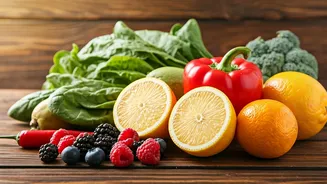Vitamin B Essentials
Vitamin B isn't just one vitamin; it's a collection of eight different vitamins, each playing a vital role in bodily functions. These vitamins are water-soluble,
meaning your body doesn’t store them effectively, making regular intake through diet crucial. The B vitamins support a wide range of processes, from energy production and cell function to the health of your nervous system and the making of red blood cells. They work together, making them integral to overall health and well-being. A balanced diet that incorporates a variety of vitamin B-rich foods is important for maintaining optimal health, ensuring your body receives the necessary building blocks to function at its best. Deficiencies can lead to several health problems.
B1: Thiamine Powerhouse
Vitamin B1, known as thiamine, plays a fundamental role in energy metabolism. It converts carbohydrates into energy, supporting your body’s daily activities. Foods rich in thiamine include whole grains, such as brown rice and fortified cereals. Lean meats, especially pork, are also excellent sources. Consuming these foods helps prevent thiamine deficiency, which can result in fatigue, muscle weakness, and neurological issues. Ensuring adequate B1 intake is particularly critical for individuals with higher energy demands, such as athletes or those with physically demanding jobs. This nutrient is important to support healthy nerve function and muscle coordination.
B2: Riboflavin Benefits
Riboflavin, or vitamin B2, is crucial for energy production and cell growth. It helps the body process fats, proteins, and carbohydrates. Dairy products, such as milk and yogurt, are excellent sources of riboflavin. Leafy green vegetables like spinach and asparagus also contain significant amounts. Deficiencies can manifest as skin problems, mouth sores, and fatigue. Adequate riboflavin intake supports healthy vision, and it aids in the conversion of tryptophan into niacin (B3). Including riboflavin-rich foods in your diet ensures efficient energy production and overall cellular health.
B3: Niacin's Impact
Vitamin B3, also called niacin, is essential for cell function and converting food into energy. It's also known for its role in maintaining healthy skin and nervous system function. Good food sources of niacin include poultry, such as chicken and turkey. Fish, especially tuna and salmon, are also rich in B3. Niacin can help reduce cholesterol levels and may reduce the risk of heart disease. A deficiency can result in skin rashes, digestive problems, and mental confusion. Including niacin-rich foods in your diet is essential for overall well-being.
B5: Pantothenic Acid's Role
Vitamin B5, also known as pantothenic acid, contributes to energy production and the making and breaking down of fats. It is widely available in various foods. It's found in animal products like eggs, beef, and chicken, and plant-based sources, such as avocados, broccoli, and mushrooms. While deficiencies are rare, ensuring an adequate intake of B5 helps maintain healthy skin, supports the nervous system, and reduces fatigue. It plays a role in producing hormones and red blood cells, making it essential for overall health.
B6: Pyridoxine's Advantages
Vitamin B6, also known as pyridoxine, helps with brain development and function, the formation of red blood cells, and the metabolism of proteins. It’s important for mood regulation and the immune system. Good food sources include fish, poultry, and potatoes. It can assist with managing symptoms of depression. Deficiencies may cause anemia, skin problems, and confusion. Incorporating vitamin B6-rich foods is essential for a well-functioning nervous system and overall health.
B7: Biotin's Benefits
Biotin, or vitamin B7, is important for hair, skin, and nail health. It also helps the body convert food into energy. Good sources of biotin include eggs, nuts, seeds, and sweet potatoes. Biotin supports healthy cell growth and metabolism. While deficiencies are uncommon, they can result in hair loss, skin rashes, and neurological issues. Ensuring an adequate intake supports healthy hair, skin, and nail development. Including biotin-rich foods helps promote cellular health and overall well-being.
B9: Folate's Importance
Folate, also called vitamin B9, is crucial for cell growth and development, particularly important during pregnancy for the development of the baby’s brain and spinal cord. Green leafy vegetables, such as spinach and kale, are great sources. Legumes, like lentils and beans, are also rich in folate. Deficiencies can lead to birth defects and anemia. Adequate folate intake is essential for women planning to become pregnant. Including folate-rich foods is essential for cellular health and overall well-being.
B12: Cobalamin Power
Vitamin B12, or cobalamin, is important for nerve function and the production of red blood cells, and it's crucial for vegetarians and vegans. It's found mainly in animal products like meat, fish, eggs, and dairy products. Those who consume a plant-based diet often need supplementation or fortified foods. Vitamin B12 helps in preventing anemia and supports neurological health. Deficiencies can result in fatigue, weakness, and nerve damage. Ensure you get B12 in your diet through animal sources or supplements if needed for overall wellness.















